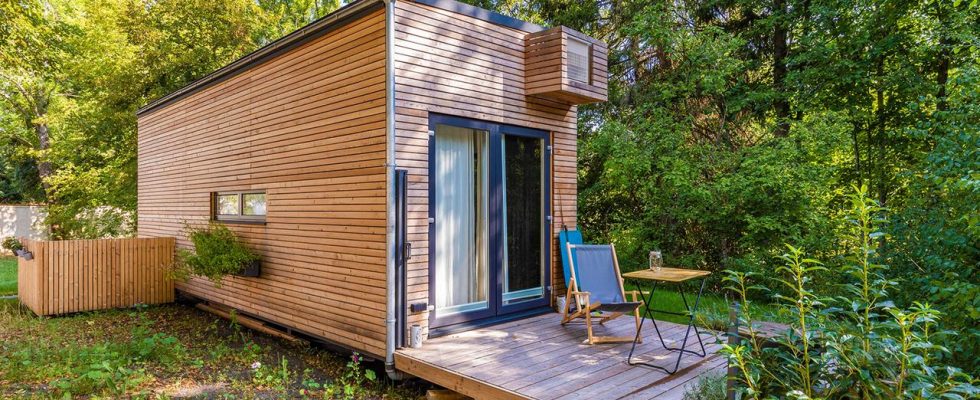faq
There are 24 million building savings contracts in Germany. How does the system actually work? And is building savings worth it again with the increased interest rates?
Building savings was long considered a popular sport in Germany, before the era of low interest rates slowly and quietly pushed the contracts into the background. According to the Association of Private Building Societies, there are still around 24 million in Germany. That’s almost every second household. With interest rates on the market rising again, building savings are experiencing a comeback – right?
How does building savings work?
A building savings contract is primarily a savings and financing option for your own property. At the beginning, the saver decides on a building savings sum that can be used, for example, as equity for the purchase. According to the Association of Building Societies, that was an average of 52,000 euros in 2021.
Building savings takes place in two phases: first the savings phase and then the loan phase. During the savings period, a certain amount is paid into the building savings contract every month, which earns interest at a previously agreed interest rate. In this way, the building saver saves part of the entire sum over a period of usually seven or ten years.
However, the saver usually doesn’t get the total amount together. It is therefore often split 50:50. With a building savings sum of 50,000 euros, you would first save 25,000 euros and then get a loan for the remaining 25,000 euros. Some building societies also set the minimum savings amount at 40 percent or 60 percent. That depends on the conditions.
When the savers have reached the minimum savings amount – for example 25,000 euros – the contract has reached the so-called “allocation readiness”. Then the loan or disbursement phase can begin. In this phase you can borrow the remaining amount of the total amount, i.e. the other 25,000 euros, from the bank at the previously agreed interest rate.
What interest rate do building societies offer?
The interest rate for this loan from the building society is often lower than that for normal building financing, which is currently making building savings contracts attractive again for many people. While the building interest rates are over three percent per year with a fixed interest rate of ten years, according to FMH Finanzberatung, the loan interest rates from building societies are currently mostly between 1.0 and 2.0 percent.
What happens to the building savings contract if the house purchase fails?
If you don’t want to buy a property after a few years of saving, you can have the savings paid out. However, if you are not sure whether a house or condominium is still an option, you can simply continue saving with the building savings contract. However, this is actually only worthwhile if the interest on the credit in the building savings contract is higher than the market interest rate. And if that is the case, the bank of course has a great interest in terminating the contract – which it is even allowed to do. The bank can terminate the building savings contract if ten years have passed since the allocation was ready.

Podcast “Gold & Ash: House Purchase Project”
In the first season of “Gold & Asche” the ARD financial editorial team The most important things when buying a house are examined step by step in seven episodes – with background information and expert knowledge. You can hear it in the ARD audio library and wherever podcasts are available. The individual episodes You will find here.
Episode 1: Is it worth buying a house? (21st of February)
Episode 2: The Right Time to Buy a Home (February 21)
Episode 3: How much house can I afford? (February 28)
Episode 4: What do I have to pay attention to when getting a loan? (6th March)
Episode 5: How the state provides financial support for buying a house (March 13)
Episode 6: Everything about energy renovation (March 20)
Episode 7: Was everything better before? (27th of March)
Why is the building savings contract worth it?
As a rule, the sum from the building savings contract is not enough as a loan for the entire house purchase. The savings phase would be far too long for that. This means that you need the “main loan” from another bank. You can use the building savings contract, for example, to increase your equity with better loan conditions.
What can I use the loan for?
In order to get the loan from the building savings contract, it must be linked to residential use. You should not use the loan from the building society for a new car, but only for things that are related to the property: for buying or building a house, renovation, interior design or, for example, renovation. Of course, this does not apply to the saved credit, which can be paid out and used for other purposes.
What are the advantages of a building savings contract?
One advantage of the building savings contract is that it can offer very favorable interest rates compared to conventional consumer loans. In addition, when you sign the building savings contract, you know exactly what interest rate you will receive on the savings amount and at what interest rate you will later receive the loan from the bank. This ensures interest rate security. And: Special repayments are possible at any time in an unlimited amount for building savings loans. With a regular loan, banks charge a little for this option. Another advantage is that the state subsidizes building savings contracts.
How does the state support Building savings contracts?
Building savings contracts are subsidized by the state through the housing construction bonus, the employee savings allowance or through Wohn-Riester. For the housing bonus, this can be a maximum of 70 euros per year for single people and double that for married couples, and for the employee savings allowance a maximum of 43 euros. With Wohn-Riester – also known as home ownership pension – the existing Riester pension can be used to receive allowances and tax advantages when buying or building a house.
What are the disadvantages of a building savings contract?
One disadvantage is the high closing fee for building savings contracts. Up to 1.6 percent of the total building savings amount must be paid right at the start. The fee is not only due for the loan part, but also for the savings amount. The consumer advice center warns that the building savings model can even be a loss-making business if the total interest on the balance is lower than the costs of the acquisition fee. With interest rates currently higher on the market, this shouldn’t be a factor at the moment.
Consumer advocate Niels Nauhauser emphasizes in the podcast “Gold & Asche: Hauskauf Project” from the ARD financial editorial team, in practice it is often determined that a building savings contract was not worth it. “This is simply due to the fact that a building savings contract has a very serious disadvantage: namely practically no interest on credit balances.” The building societies advertise low loan rates of, for example, one percent. In return, building savers receive a comparatively low interest rate for the savings phase.
At some building societies, building savers currently only receive 0.01 percent interest on the sum saved, while daily money earns more than two percent interest. It becomes particularly annoying when, after years of saving at low interest rates, you decide against buying a house and don’t even take out the cheaper loan for which you have accepted the low interest rates for so long.
In addition, the building savings contract is relatively inflexible. After all, you can only get the loan if a certain amount has been saved. However, it is not so easy to calculate exactly when you need the loan.
Is building savings worth it again?
For these reasons, according to the consumer advice center, building savings contracts are more worthwhile for smaller loan amounts of less than 50,000 euros, which are already sufficient for conversions or renovations. Without a building savings contract, banks often issue expensive consumer loans with poorer interest rates for smaller sums.
As far as loans are concerned, building savings contracts are worthwhile again compared to before, says Günter Vornholz from Immobilien Research ARD financial editorial team. There are low interest rates during the savings phase, but at the same time you have the opportunity to get a cheap loan afterwards. But you have to consider what your individual living conditions look like. Are you planning to own your own property or can you even save regularly? Building savings could then be a useful building block for financing a property. However, there is still a risk of wasting the interest.
From the point of view of the financial book author Gerd Kommer, building savings contracts are only worthwhile for households that are almost certain to purchase a residential property in Germany in the next ten years and finance it to a large extent with external financing. A building savings contract is only suitable if you don’t need the loan for anything else. “All those for whom one or more of these restrictive conditions or assumptions do not apply would be better advised to approach their planned real estate financing without a building savings contract,” says Kommer.

